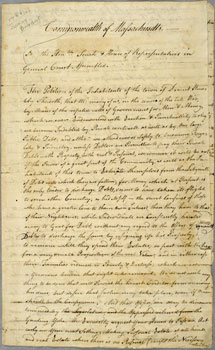Essay
Getting By & Getting Ahead - Petition & Protest
"The Labyrinth of Debt"

This petition from the town of Dracut to the Massachusetts General Court was typical in both the grievances it listed and in the remedies it proposed.
More info
Courtesy American Antiquarian Society, Worcester, MA
To pay the state's large war debt, the Massachusetts government had increased taxes. In order to obtain the cash to pay those taxes, people called in private debts. The consequence, as a County Convention held at Worcester in September, 1786 noted, was "an amazing flood of lawsuits." (1)
The problem was that there was not enough cash in circulation to meet the increased demand. Matthias Rice of Pepperall replied to his creditor's repeated demands for payment for two debts that "[I]t has not been in my power to pay them as yet, nor can think that is possable to pay them this Spring unless I can turn lumer [?] into Cash." Rice wrote with frustration that "if I was to sell Every thing that I have on Earth it would not obtain Money, you must Sir be very Sensible that it is out of the power of pepol in general to command cash at this time." (2) As debtor defaults rose, the numbers of people imprisoned for non-payment of debts skyrocketed. (3) Deputy Sheriff Thomas Ward of Shrewsbury was kept busy arresting debtors on behalf of creditors determined that obligations be satisfied "one way or the other." By December 1785, over 20 debtors were crowded into a tiny unheated garret in the Worcester County debtor's prison where they plaintively petitioned for relief from conditions "by no means fit for any of the Human Race."( 4)
Petitions pleading for legislative relief inundated the General Court. Citizens of Athol reported that "our property is torn from us Our goals filld [with debtors] and Still our Depts not Discharged but our property Daily Diminishing…" (5) Dracut joined other towns in asking the government to pass laws making real and personal estate as well as gold and silver a legal tender. Otherwise, the Dracut petitioners informed the General Court, it would be "out of the Power of a great part of the Community, as well as the Inhabitants of this town, to Extricate themselves from the Labyrinth of Debt into which they are fallen…" (6) A petition from the town of Greenwich assured the governor and legislature that "We are sencable also that A great Debt is Justly brought upon Us by the War and we are as Willing to pay our share towards itt as We are to injoy our shars in independancy and Constatutional priveledges in the commonwelth if itt Was in our power." But, the petitioners pointed out,
when we Compute the taxes Laid upon us the five preceeding years the State & County town and class taxes the ammount is Equil to What our farms Will Rent for sirs in This situation What have We to Live on: No money to be had: our Estates dayly polled and sold…What can your honours Ask of us unless A paper Currancy or some other meadium be provided so that we may pay our taxes and Debts. (7)
On September 26, 1786, the Hampshire Gazette published an anonymous letter blaming the current unrest and court closings on high taxes: "The body of the people do not understand politicks; but they know…that greater sums in taxes are demanded of them than many of them can pay…" (8) To make matters worse, tax revenues were going not only toward the large foreign debt accumulated during the war, but also to pay the interest on state securities bought up at depreciated rates by those possessing the nerve and the resources to speculate in them. Many people, including returning veterans, had been forced by circumstance to sell these same securities for a fraction of their value. Now, asked "An Old Soldier" in the Hampshire Herald,
Shall the man, who has sauntered at home during the war, enjoying the smiles of fortune: wallowing in affluence, and fattening in the sunshine of ease and prosperity:- and shall I be taxed with my little farm to make them good in the hands of the present holders, who are mostly men of this description: forbid it humanity: forbid it gratitude and justice (9)
| Print | Top of Page